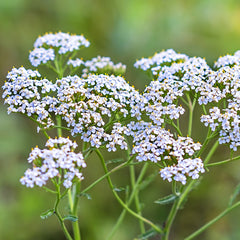Yarrow
Nature’s Astringent for Balanced Skin & Scalp
Yarrow, Achillea millefollium, is a hardy, aromatic perennial herb in the sunflower family found growing wild throughout temperate regions of the Northern Hemisphere. Its feathery, finely divided leaves give rise to the species name millefolium, meaning “a thousand leaves,” and its clusters of small, daisy-like white flowers make it easy to recognize.
The genus name Achillea comes from Greek mythology. According to legend, Achilles' mother bathed him in yarrow to make him invincible, missing only his heel, which became his fatal weakness.
Yarrow is one of humanity’s oldest healing herbs, with a history that stretches back to our earliest relationships with plants as medicine. Pollen from yarrow was found in a Neanderthal burial site in present-day Iraq dating to approximately 60,000 BCE.
For centuries, yarrow has been valued as a topical herb with astringent, antimicrobial, and anti-inflammatory properties. It has traditionally been used in healing salves and ointments to help cleanse wounds, support skin repair, and reduce the risk of infection.
Topical Benefits of Yarrow for Skin
Yarrow is especially prized in skincare for its high tannin content, which gives it strong natural astringent properties. These compounds help tone the skin, tighten pores, and regulate excess oil production, making yarrow particularly useful for oily, acne-prone, and problem skin.
Its anti-inflammatory compounds help calm redness and irritation, making it beneficial for inflammatory skin conditions such as eczema and rosacea. Yarrow has also been used to help soothe irritated, congested skin and support healing of minor cuts, scrapes, and blemishes.
A yarrow-infused tea is often used as a natural facial toner to cleanse pores and reduce oil. A facial steam containing astringent yarrow can be helpful for clogged pores. Key skin benefits of Yarrow include:
- Astringent & Toning: Tightens and minimizes the appearance of enlarged pores, contributing to a smoother and more refined complexion.
- Oil Balancing: Helps regulate sebum production, making it particularly beneficial for people with oily or acne-prone skin.
-
Anti-inflammatory & Soothing: Calming redness and irritation associated with skin conditions such as acne, eczema, and rosacea.
- Antimicrobial: Antibacterial and antifungal properties can be beneficial for managing acne-prone skin by fighting blemish-causing bacteria.
- Wound Support: Traditionally used to help heal minor cuts and scrapes
Hair & Scalp Benefits of Yarrow
In hair and scalp care, yarrow has long been used to support scalp balance and hair vitality. Its astringent properties help control excess oil on the scalp, while its anti-inflammatory and antimicrobial compounds may help soothe itchiness and reduce dandruff.
Yarrow is also valued for its ability to help remove buildup from the scalp, improve circulation, and strengthen hair follicles. Herbalists have traditionally used strong yarrow tea rinses to promote shine, volume, and overall scalp health. Key benefits include:
- Balances Oily Scalp: Helps control excess oil and buildup
- Soothes Irritation: Calms itchiness, dandruff, and inflamed scalp conditions
- Supports Hair Growth: Improves circulation to nourish follicles
- Strengthens Hair: Vitamins and minerals help reduce breakage
- Adds Shine & Manageability: Smooths the hair cuticle for increased luster and manageability
Steam, Relaxation & Traditional Uses
Yarrow has a long history of use in herbal steams and baths, where warm water and vapor help release its beneficial compounds in a gentle, effective way. These traditional preparations allow yarrow’s naturally occurring volatile oils, tannins, and anti-inflammatory constituents to be delivered through warm, moist steam—supporting both skin comfort and respiratory ease.
Herbal Baths & Steam Inhalation
In baths and steam inhalations, yarrow has traditionally been used to help ease congestion associated with colds and flu. Its astringent and anti-inflammatory properties may help reduce swelling of the mucous membranes while supporting the body’s natural ability to clear excess mucus. Warm vapor carries yarrow’s aromatic compounds into the airways, creating a comforting, clearing sensation that supports easier breathing and overall relaxation.
Facial Steams for Skin
Yarrow is especially valued in facial steam treatments, where the combination of warm vapor and botanical infusion provides multiple benefits:
- Steam gently opens pores and boosts circulation
- Yarrow’s astringent compounds help tighten pores and balance oil production
- Anti-inflammatory properties soothe redness and irritation
- Antimicrobial activity helps cleanse acne-prone skin and support healing
As the steam rises, it carries yarrow’s water-soluble and volatile compounds to the skin’s surface, allowing for a deeply cleansing, toning, and restorative experience. Facial steams with yarrow are often used to calm irritated skin, refine enlarged pores, and support clearer, more balanced complexions.
Relaxation & Nervous System Support
Historically, yarrow has also been used as a mild sedative herb, valued for its ability to promote relaxation and ease nervous tension. When included in herbal bath and steam blends, it contributes to a calming ritual that comforts both body and mind—making it a thoughtful addition to preparations designed for stress relief, quiet moments, and gentle nighttime routines.



